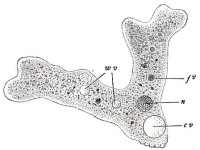By Creation Moments Are we Christians becoming less able to defend the truths of Scripture, like creation? Dozens of studies show that not only are we, as a group, less ready to defend the hope that we have in Christ, but also we are less able to explain why we have that hope. read more …read more Read more here: Creation Moments
By Creation Moments A family reunion among spiders is not a pretty thing. Many of the some 35,000 species of spiders begin eating their siblings as soon as they hatch. For this reason, spiders are typically lone hunters. Evolutionists have always explained that spiders evolved this way because it works best for them. read more …read more Read more here: Creation Moments
By radio@answersingenesis.org (Steve Ham) …read more Read more here: Answers Conversation
By Creation Moments When you know who made something and why it was made, you know the purpose of the item. That’s true of can openers, and it is true of human life. Anyone who doesn’t know who designed us or why is almost certain to be confused about their purpose in life. read more …read more Read more here: Creation Moments
By Creation Moments Researchers have been trying to find out what is causing frogs to grow extra legs, or in some cases, grow no legs at all. While frogs with extra legs or no legs have been reported for centuries, there was some question about whether the incidence was increasing. Some suggested human pollution was to blame, while others suggested an increase in ultraviolet radiation was causing the problem. read more …read more Read more here: Creation Moments
By Creation Moments When scientists completed the first genetic map of an animal, they found that the results have the signature of our Creator all over them. This animal is the nematode, a very small worm. Even though it has only about 1,000 cells, it is very much like more complex animals. It has a nervous system, a brain, and it reproduces sexually. Scientists picked the species because, being transparent, it would be easier to work with. read more …read more Read more here: Creation Moments
By Creation Moments Physicians have been mystified by and are in the process of studying GOD. But in this case, the acronym “GOD” stands for “generation of diversity.” The diversity that amazes them is the diversity found in our immune system. While we have fewer than 100,000 genes, our immune system is able to generate tens of millions of distinct antibodies to defend and protect itself from disease. How can only 100,000 genes produce thousands of times that many antibodies? read more …read more Read more here: Creation Moments
By Creation Moments Some time ago here on Creation Moments we did a program about Asian fireflies that flash in unison. The unspoken question was, “Aren’t there some American species that flash in unison?” Someone in Tennessee who saw the same reports on which our program was based had the answer to that question. She contacted a researcher at Georgia Southern University to report an American species that clearly flashes in unison. read more …read more Read more here: Creation Moments
By Creation Moments What’s left to be discovered? Many people have the idea that scientists have discovered just about everything when it comes to everyday subjects. Sure, scientists are searching for cures for many diseases and making discoveries of new atomic particles. But when it comes to common things, say botany, even many scientists think everything has been discovered. read more …read more Read more here: Creation Moments
By radio@answersingenesis.org (Steve Ham) …read more Read more here: Answers Conversation
By Creation Moments For years those filled with anger were advised to vent their anger. Supposedly, venting one’s anger – hitting a pillow, breaking things, yelling – would get rid of the anger. To many people, such advice seemed contrary to the spirit of Scripture. And a few more conservative voices in the counseling community maintained that far from dealing constructively with anger, venting actually increases it. read more …read more Read more here: Creation Moments
By Creation Moments Scientists who believe in creation often point out that when we finally learn the genetics of a creature, that information doesn’t match its supposed evolutionary history. There are many examples of this, and a new example was reported in the scientific literature at the end of 1998. read more …read more Read more here: Creation Moments
By Creation Moments The deep, dark depths of the ocean are filled with many varieties of luminescent creatures. But among the octopus there are only two or three species in which the females develop luminescent rings around their mouths. But that has all changed with a remarkable series of discoveries about an already-known species of octopus. read more …read more Read more here: Creation Moments
Listen Now. Part 2 On this episode of ID the Future, Casey Luskin interviews Dr. Ann Gauger, co-author of Science & Human Origins and senior research scientist at the Biologic Institute. In recent years, human origins has become an especially hot topic as some scientists claim that the human race is a product of undirected natural selection and cannot be traced back to two parents. Dr. Gauger disagrees. Tune in to hear Dr. Gauger discuss the evidence against human-ape common ancestry, drawing from her research in such fields as anatomy and population genetics.
By Creation Moments Do good parents undo their best efforts when they place a child in day care? Who has more influence on a child’s development when that child must be placed in day care? Recently we have heard about many studies, some of which arrived at conflicting conclusions. Some said that parents have little or no effect on their children’s development. Others concluded that day care doesn’t influence a child’s development at all. Now unique new research seeks to clear this up. read more …read more Read more here: Creation Moments
By Creation Moments Perhaps you remember the line from the film Amadeus in which someone observes of Mozart’s music, “Too many notes.” That statement reflects some people’s opinion of Mozart’s highly complex music. But researchers are finding that this mathematical complexity may be the reason for what some call “the Mozart effect.” read more …read more Read more here: Creation Moments
By radio@answersingenesis.org (Steve Ham) …read more Read more here: Answers Conversation
By Creation Moments Just about every public school textbook once included the example of the peppered moth. The moth is used as a prime example of natural selection. Supposedly, as the trees in the English countryside began to be covered with coal pollution in the mid 1800s, the light colored tree trunks became darker. The peppered moth exists in two varieties – black and white – and was said to rest on the tree trunks. read more …read more Read more here: Creation Moments
By Creation Moments Not all dangerous predators can be seen. One of the most dangerous predators in a drop of pond water is Amoeba proteus. This amoeba literally terrorizes its one celled pond mates because they can smell him coming to engulf them. Among his favorite snacks are one celled creatures of the genus Euplotes. But Euplotes can defend themselves. When some members of this genus smell the amoeba coming, they dart away to safety. read more …read more Read more here: Creation Moments
By radio@answersingenesis.org (Steve Ham) …read more Read more here: Answers Conversation
By radio@answersingenesis.org (Steve Ham) …read more Read more here: Answers Conversation
Listen Now. On this episode of ID the Future, the CSC’s Rob Crowther speaks with Casey Luskin, co-author of the new book Science & Human Origins. There are frequent and spurious claims made in the media that the genetic and fossil evidence of human-ape common ancestry is incontrovertible. In Science and Human Origins, Doug Axe, Ann Gauger, and Casey Luskin seek to equip readers with the knowledge to discern interpretation from fact and rhetoric from evidence. Listen in as Luskin introduces the book and specifically discusses his own assessment of the fossil data.
Click here to listen. On this episode of ID the Future, hear Casey Luskin’s interview with Issues, Etc., in which he responds to false claims that intelligent design theory is based on religious belief. Casey discusses how many Darwin doubters have found the scientific evidence for Darwinian evolution to be greatly lacking, despite claims of a “scientific consensus” on evolution.
By Creation Moments Scripture frequently makes reference to the fact that birds are not very smart compared to human beings. The tropical wetland bird called the jacana shows that you don’t have to be very smart to be deceptive. The jacana is noteworthy for several reasons. It is one of only 20 species of birds in the world where the female leaves the care of the young to the males. read more …read more Read more here: Creation Moments
By Creation Moments How do you take a much needed nap or get a good night’s sleep when you must be alert to danger? Human beings designate people to stay awake and watch for danger when they sleep. Then, they set up warning systems. read more …read more Read more here: Creation Moments
By Creation Moments Sometimes it seems as if God made some creatures just to show us He could do the impossible. Many of these creatures, by their strange nature, offer direct challenges to evolutionary theory, since there was no evolutionary need for their unique nature. read more …read more Read more here: Creation Moments
By Creation Moments Has your great great-grandfather been born yet? If he hasn’t, he’s not your great great-grandfather! This might seem like a silly question. But when it comes to the claimed evolutionary fossil evidence for man’s evolution, our claimed great great-grandfather has turned up in the wrong period of history. read more …read more Read more here: Creation Moments


















![Bill & Gloria Gaither – Suppertime [Live] ft. George Younce Bill & Gloria Gaither – Suppertime [Live] ft. George Younce](http://img.youtube.com/vi/_R-xa7mkGDU/0.jpg)











